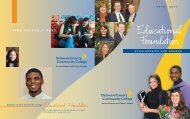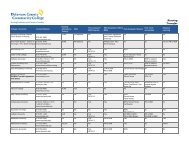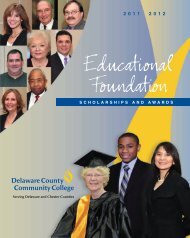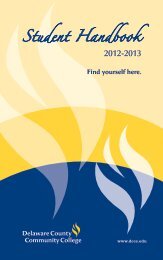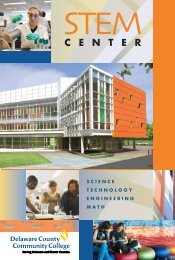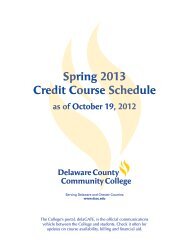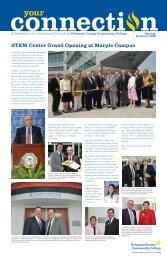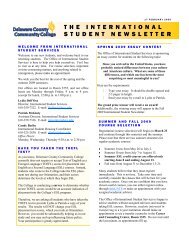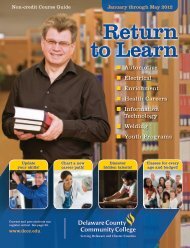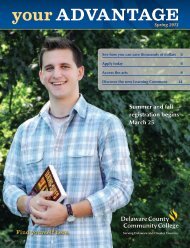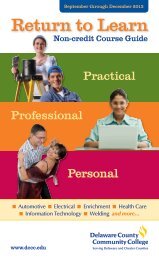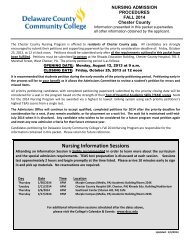2010 Catalog - Delaware County Community College
2010 Catalog - Delaware County Community College
2010 Catalog - Delaware County Community College
You also want an ePaper? Increase the reach of your titles
YUMPU automatically turns print PDFs into web optimized ePapers that Google loves.
158 COURSE DESCRIPTIONS<br />
RTH 203 Respiratory Therapy<br />
Practicum IV<br />
This course is a supervised clinical practice.<br />
Upon successful completion of this course, students<br />
should be able to:<br />
• Administer bronchopulmonary hygiene and ventilator<br />
support to neonatal and pediatric patients.<br />
• Perform respiratory care in the subacute setting.<br />
• Administer bronchopulmonary hygiene and ventilatory<br />
support to critically ill adult patients.<br />
• Perform and recommend cardiovascular diagnostic<br />
testing as appropriate to respiratory care.<br />
Prereq. RTH 201, RTH 204 Coreq. RTH 202, RTH 205<br />
6 Credits 12 Weekly Laboratory Hours<br />
RTH 204 Pulmonary Pathophysiology<br />
Clinical Rounds I<br />
This course is a supervised clinical study of pulmonary<br />
pathophysiology.<br />
Upon successful completion of this course, students<br />
should be able to:<br />
• Describe the etiology, pathology, functional abnormality,<br />
PFT results, pulmonary assessment data, clinical<br />
features, treatment and prognosis of the major diseases<br />
effecting the respiratory system.<br />
Prereq. RTH 105 Coreq. RTH 200, RTH 201<br />
2 Credits 4 Weekly Laboratory Hours<br />
RTH 205 Pulmonary Pathophysiology<br />
Clinical Rounds II<br />
This course is a supervised clinical study of pulmonary<br />
pathophysiology.<br />
Upon successful completion of this course, students<br />
should be able to:<br />
• Describe the etiology, pathology, functional abnormality,<br />
PFT results, pulmonary assessment data, clinical<br />
features, treatment and prognosis of the major diseases<br />
effecting the respiratory system.<br />
Prereq. RTH 201, RTH 204 Coreq. RTH 202, RTH 203<br />
2 Credits 4 Weekly Laboratory Hours<br />
RTH 206 Respiratory Therapy<br />
Summer Clinical III<br />
This course is a supervised clinical practice.<br />
Upon successful completion of this course, students<br />
should be able to:<br />
• Administer and evaluate the results of<br />
polysomnographic testing.<br />
• Perform and recommend invasive cardiovascular<br />
diagnostic testing as appropriate to respiratory care.<br />
• Administer bronchopulmonary hygiene and ventilatory<br />
support to critically ill adult patients.<br />
Prereq. RTH 203, RTH 205<br />
4 Credits<br />
(RUS) Russian<br />
RUS 101 Elementary Russian<br />
Special Studies<br />
This course introduces students to the Russian language<br />
by focusing on the development of functional competence<br />
in the four skills (listening, speaking, reading, and writing),<br />
as well as the expansion of cultural knowledge. Students<br />
completing this course will learn about the basic structure<br />
of Russian grammar and writing as well as become familiar<br />
with elementary conversational skills.<br />
Upon successful completion of this course, students<br />
should be able to:<br />
• Recognize the essential differences between the Russian<br />
and English pronunciation systems<br />
• Understand in oral and written form first-level content<br />
words and grammatical principles<br />
• Read aloud in Russian with due attention to principles<br />
of good pronunciation including word stress and<br />
intonation patterns<br />
• Produce appropriate pattern and sentence transformation<br />
• Write in dictation from with a reasonable degree of<br />
accuracy from materials that have been studied<br />
• Recall familiar facts of Russian and Slavic civilizations<br />
from reading assignments<br />
3 Credits 3 Weekly Lecture Hours<br />
SCI 100<br />
(SCI) Science<br />
Man & Environment<br />
A study of the design of the natural world and the impact<br />
of humans on the environment. It also includes a study of<br />
the environmental problems created by our technology.<br />
Topics include basic ecology, the population explosion,<br />
energy and pollution. Field trips may be included.<br />
This course is an elective designed for non-science majors.<br />
Upon satisfactory completion of this course, students<br />
should be able to:<br />
• Analyze the design of the real world.<br />
• Describe the dynamics of the population of different<br />
species excluding man in the biosphere.<br />
• Interpret the dynamics of population and future<br />
implications if population growth remains unchecked.<br />
• Analyze the energy alternatives to meet the demands of<br />
technology and growing population on the world's<br />
natural resources.<br />
• Analyze adverse effects of modern societal values and<br />
priorities on the biosphere.<br />
• Formulate applications of environmental concepts to<br />
one's interests through integration activities.<br />
Prereq. REA 050 or Equiv.<br />
4 Credits 3 Weekly Lecture Hours<br />
2 Weekly Laboratory Hours<br />
SCI 105<br />
Introduction to Nanotechnology<br />
This course will cover the application of nano-technology<br />
to electronic, chemical, and biological fields including a<br />
review of the basic science concepts. The impact of the<br />
commercialization of nanotechnology on society and the<br />
environment will be discussed. It is intended primarily<br />
for students in any of the various technology programs<br />
who will seek employment as laboratory technicians in<br />
research and industrial laboratories. Emphasis will be<br />
placed on providing a broad overview of the field.<br />
Upon successful completion of this course, students<br />
should be able to:<br />
• Demonstrate an understanding of scientific notation<br />
and size relationships between nanometers and other<br />
metric measures.<br />
• Describe the societal impacts of nanotechnology on<br />
modern society.<br />
• List at least five biological applications of<br />
nanotechnology.<br />
• Find, using Internet research, five commercial<br />
applications of nanotechnology.<br />
• Describe the structures known as nanotubes and bucky<br />
balls, and one current application of each form.<br />
• Describe the application of nanotechnology<br />
in environmental and medical sensors to<br />
electronic monitoring.<br />
• Define key nanotechnology concepts such as "buttomup",<br />
"self-assembly", and "molecular recognition".<br />
• Discuss instrumentation, such as SEM and STM, which<br />
is used at the nano level.<br />
• Hypothesize future applications of nanotechnology.<br />
Prereq. REA 050<br />
3 Credits 3 Weekly Lecture Hours<br />
SCI 110<br />
History of Science<br />
This course, designed as a non-laboratory science<br />
option for non-science majors or as an open elective for<br />
Natural Science majors, traces the philosophical, cultural,<br />
intellectual, and technological developments that influenced<br />
the evolution of modern science. By examining these<br />
developments made over a span of two millennia,<br />
students in the course identify the people, places, ideas,<br />
and discoveries that led to fundamental shifts in worldviews<br />
resulting in changes in the way people obtain knowledge<br />
about, investigate, and understand the physical world.<br />
Specifically, the course explores the origin and influence of<br />
scientific methodologies by tracing the changing role of<br />
experimenters, their experiments, and the tools they<br />
used. In addition, students document the converging<br />
influences that resulted in the Scientific Renaissance and<br />
the Scientific Revolution. The course concludes by<br />
highlighting important scientific discoveries up to the<br />
present day and the continuing struggle between science<br />
and long-held misconceptions and beliefs.<br />
Upon successful completion of this course, students<br />
should be able to:<br />
• Develop an answer to the question ‘What is science?’,<br />
state the basic assumptions underlying modern science,<br />
and discuss the origins of these assumptions<br />
• Define ‘scientific paradigm’, describe its influence on the<br />
development of science, and outline the factors that<br />
result in a change of the scientific paradigm<br />
• List the characteristics of a scientific methodology<br />
• Understand the role politics, religion, and commerce<br />
played in the history of science<br />
• Explain the difference between deductive and inductive<br />
arguments and their role in the study of the physical<br />
world, identify people who employed them, and give<br />
examples of each form<br />
• Describe the approaches and contributions to science of<br />
Greek, Islamic, Chinese, Indian, and European thinkers<br />
and identify the people and places associated with<br />
these approaches and contributions<br />
• Outline the changing role of experimentation in the<br />
history of science, the tools used in the experiments,<br />
and describe their influence on the origin of<br />
scientific methodology<br />
• List examples and relate the significance of the people,<br />
places, ideas, and discoveries that were part of the<br />
Scientific Renaissance<br />
• Describe the emergence of the Scientific Revolution from<br />
the Scientific Renaissance and provide examples of<br />
important scientific discoveries over the past three<br />
hundred years<br />
• Identify current areas where scientific research is in<br />
conflict with popular beliefs and analyze a selected<br />
conflict by examining all arguments put forth in the<br />
context of the scientific method and the history<br />
of science<br />
Prereq. ENG 100<br />
3 Credits 3 Weekly Lecture Hours<br />
SOC 100<br />
(SOC) Sociology<br />
Human Relations<br />
This course is designed as an introduction to the<br />
basic principles of sociology with emphasis on human<br />
relationships in community and industrial settings.<br />
Upon successful completion of this course, students<br />
should be able to:<br />
• Explain the importance of human relations in the<br />
community and occupational spheres.<br />
DELAWARE COUNTY COMMUNITY COLLEGE



